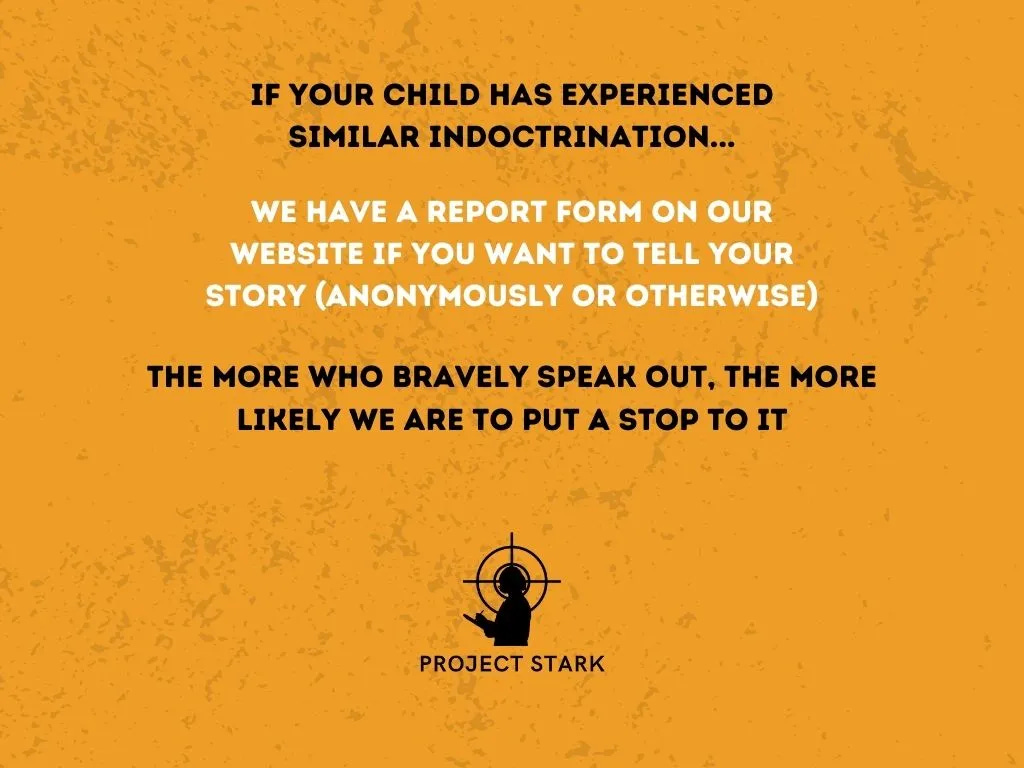Exclusive: How One of Britain's Most Prestigious Boarding Schools Hid Troubled Trans-Identified Teen’s Self-Medication From His Parents
Father recounts relentless battle to protect his struggling son from activist clinicians, negligent school staff, and online groomers.
Project Stark recently interviewed a UK-based father who provided a distressing account of his young teenage son's "gender transition." His story sheds light on the profound and unique challenges faced by parents with purported gender dysphoric children.
Often, these parents face intense resistance when attempting to delay their child undergoing social and medical transitioning, especially as that child seeks affirmation from and within institutions already captured by trans ideology.
Parents become powerless. Their wishes are ignored or dismissed. Their ability to protect their child is diminished.
In line with our previous parent whistleblower reports, we have used pseudonyms, Richard (father), Amelia (mother), and Fred (son), to maintain their anonymity and shield them from potential backlash.
When Richard sent his 13-year-old son to one of Britain’s most prestigious, conservative boarding schools, little did he know that this decision would threaten his son’s health and wellbeing in the coming years.
Prior to joining the school, Fred had experienced a lot for a child. At 10, he reported regular social issues at school. Classmates would call him “weird” and point and laugh at him for having no friends. He would frequently come home crying and express a lack of understanding of how to fit in. Compounding problems, his teachers also revealed that he was struggling in the classroom. Something they first attributed to laziness.
To help identify the cause, Fred underwent a psych-education assessment, scoring in the ‘superior intelligence’ bracket. Although clearly gifted, it was obvious he possessed innate disadvantages that made tasks involving handwriting and working memory - a term academics use to describe an individual’s capacity to work with information without losing track of the activity at hand - difficult.
So, with his poor emotional state and social isolation, the school recommended a Children and Adolescent Mental Health Service (CAMHS) assessment.
This was shortly before Fred, now 11-years-old, experienced his first breakdown.
One evening, his mother Amelia finds her son at home in a state of hysteria, holding a knife to his throat, threatening to harm himself. Fred’s condition is so frantic that his mother genuinely fears he could fatally harm himself, even if he does not intend to. Thankfully, she calms him and retrieves the knife. From this point on, it is firmly understood how vulnerable Fred is. In response, she pleads with CAMHs for an urgent appointment.
During the appointment, Fred downplays his actions and refuses any other sessions. Both his parents agree not to push for them. Over the next few months, with careful monitoring, his condition improves. Issues with school work, however, continue.
When Fred is about to turn 12-years-old, he exhibits signs of starting puberty. Soon, his parents learn he has been in contact with an individual online - the assumption is that this person is a girl of a similar age - sending him or her sexual messages and pictures. Worried Fred is putting himself at risk and could provoke potential police action, his parents restrict his internet access. He is warned of the dangers of contacting strangers online and told not to contact the individual again.
Unbeknown to his father, Fred persists. A year later, Richard discovers a communication trail on a gaming app with the same individual, talking about how they’re “furry-identified”. This is the first incidence in which his son shows signs of “gender variance”. Furries is a term used to describe those who identify with anthropomorphic animals, creating personas around them.
It later transpires that Fred has sent a letter with a thumb drive to the individual, which is intercepted by the individual’s father. The individual tells Fred they must cease all contact. Richard warns his son once again and tells him he’ll have to impose more internet restrictions if such behaviour continues.
Seeking more appropriate schooling for his son, Richard then enrols Fred, now 13, into a private boarding school, assuming that the staff would be well equipped to care for his needs and that the environment might provide the right structure for him to thrive.
Unfortunately, Fred, highly internet literate, circumvented his internet restrictions while boarding and contacted other “furries” online. Except, the problem now was that Richard suspected these individuals were adults as well as children. He feared groomers were talking to his son.
Naturally, Richard blocked Fred from various online messaging service apps and forums - Instagram, Discord, Google Hangouts, Skype, and Trevorspace (an “affirming international community for LGBTQ young people ages 13-24”) - but at every turn, Fred found alternative avenues. The problem was getting worse. Restrictions were simply not working.
The rest of his first year saw Fred sext a number of adults and older teenagers (both male and female) online, sometimes strangers, sometimes not, which eventually culminated with an intervention from local police. At 14, Fred sent and received sexual images from a 12-year-old girl at the school whose father reported it to the deputies and the local Multi-Agency Safeguarding Hub (MASH).
Ultimately, the situation dissipated. Police determined that since both parties were underage and no photos were shared, a stern warning would suffice. Now, the boarding school was fully aware of Fred’s risky online behaviour and suspected bisexuality.
Richard responded in what little way he could and disabled his son’s camera on his phone and reissued warnings about the consequences of his behaviour. Fred’s housemaster also reprimanded him and made it clear, “2 strikes and you’re out”. One more mess up and he was gone.
That summer, while at home, Fred engages in yet more sexual behaviour online. While surveilling his internet access, Richard unearths messages from his son requesting nudes from girls, asking to attend naked hangouts, and seeking older men to share photos with. He broke through his internet restrictions every time despite near-constant monitoring.
It is during this summer when Fred first exhibits forms of body dysmorphia. One day, he spends hours in the shower and completely shaves his body, expressing disgust at his hair.
A few months later, the hammer drops.
Fred, 15, outs himself as “trans” to his matron at school. Richard is taken back. He urges caution, particularly given Fred's history of mental health struggles. His son is, nonetheless, fixated on immediately obtaining a Gender Identity Development Services (GIDS) referral and puberty blockers.
His concerns are soon justified. He catches Fred sending and receiving more sexual images, this time with a 13-year-old girl whose parents report it to police. Another police visit occurs, where another stern warning is given. Weeks later, Fred physically attacks his mother when she attempts to record his behaviour, which had become increasingly aggressive. Fred displays very little sympathy over the incidence and fails to grasp that he physically assaulted his mother.
Again, his parents seek the advice from experts, desperately worried and concerned for their son’s mental welfare. They contact the school GP and seek referrals and counselling. However, waiting times for GIDS appointments and CAMHS assessments are extensive.
Thinking that his parents and doctor are unfairly delaying proceedings, Fred then resorts to emotional blackmail. He threatens to harm himself until he gets puberty blockers and cross-sex hormones. Such threats manifest in various forms such as overdosing, self-harm, and even suicide but no evidence of real self harm or drug-hoarding are found.
It was only in retrospect that Richard discovered his son was in contact with two transgender adults online, who were coaching him in how to be litigious to get his way.
Richard is acutely aware of the controversy surrounding GIDS. When Fred's GP requested a referral, the service was under judicial review. This followed whistleblower Dr. David Bell's testimony, stating that the service was "not fit for purpose." Dr. Bell outlined how children were being prescribed experimental drugs "after a few sessions and without proper investigation of their cases," under pressure from transgender rights groups.
In 2022, an interim independent report commissioned by the UK government found that GIDS treatments were “not safe, nor viable”. In 2024, the final report, based on a raft of peer-reviewed studies, detailed the services’ reprehensible lack of research and “remarkably weak” evidence base.
Here a rift emerges between Richard and Amelia. Richard, though liberal in his views on sexuality, was extremely wary of the permanent consequences of social affirmation and puberty blocker and cross-sex hormone use. So he continued to urge caution and counselling, particularly in light of the rise of transition regret stories like Chloe Cole. Amelia, on the other hand, was more open to it - at least in terms of a social transition.
Starting the new term, Fred returns to the school. Staff are well aware of Richard’s concerns over his son’s trans-identity and troubling behaviour. They also have been notified of his online activity, having previously rebuked him themselves for it. However, within days of returning, Fred emails the school’s IT department, who reinstate all administrator rights and access on his laptop. There are no safeguards in place, no communication between his school carers and the department.
From here, the school’s duty of care to Fred disintegrates.
Richard hears Fred has changed his name (he chooses a common female name). His stationary, room tags, roll call registration are all altered. The school completely affirms 15-year-old Fred’s trans-identity against his father’s express wish.
Fred then uses his school email to contact Dr Lorimer of Gender Care, a “network of individual healthcare practitioners, all qualified professionals experienced in the gender field”. He asks for puberty blockers but is told they do not treat under 18s anymore.
Frustrated with his inability to obtain medication, Fred feigns approval of a Gender GP - a telemedicine service that prescribes gender dysphoric children medication - referral from his GP to his mother. In 2017, the British Medical Council suspended Gender GP founder, Helen Webberly, over allegations that she failed to provide adequate advise to a 11-year-old patient about the risks to fertility arising from treatment. It is found that Fred’s GP said quite the opposite.
Increasingly desperate, Fred claims he will sue his doctor if he does not receive puberty blockers and cross-sex hormones. He is still 15-years-old at this point.
In the interim, Richard contacts Transgender Trend, an organisation advocating for an evidence-based social and clinical approach towards children who self-identify as transgender. The organisation sends an information pack, citing research that shows medication and other forms of affirmation provides no guarantee of mental health improvement, but the school never confirms receipt. Richard is told it was accidentally disposed of.
Events in the following months can only be described as parental torture.
Richards unearths evidence of his son selling nudes online - to an adult - and finds a paper trail of payments (totalling £300) to a Paypal account in his name. The fear is he is attempting to fund his own medication as his pocket money had stopped. Richard reports the incident to police and notifies Fred’s housemaster. He also reintroduces internet restrictions. But these, as history has proven, only last so long. Every time Richard confiscates his devices his son finds others to use, either from friends or stealing ones from his parents.
Days later, on Christmas Eve, Richard sees his son in a state of rare happiness playing a video game at home. He grabs his phone and to take a picture of the moment. Except, he makes a mistake. He leaves the flash on. His son rapidly turns his head and chases him, enraged that he has taken a picture without permission. A fight ensues. Fred punches his father twice in the temple and kicks his shin. Richard is devastated. He wanted to commemorate a scene of his son happy, not provoke him to anger.
This is proceeded by Fred, now 16, reporting his own family to social services, accusing his father of being “transphobic”. When social services visit Richard and Amelia, they suggest Fred has a strong likelihood of self-harm. Both disagree. When Fred hears the latter, listening in on the meet, he goes into the bathroom and makes 10 shallow cuts on his forearm in protest. Social services conclude their report and encourage Richard and Amelia to seek help from the controversial transgender charity group Mermaids - an organisation whose former head once endorsed puberty blockers for 9-year-olds.
Fred’s desperation reaches its apex when he visits the school doctor and tells her he has been surveying school buildings to jump off. The doctor gets him admitted to hospital where Fred effectively bed blocks in a bid to force medication. It fails and the school sends Fred home.
The situation is clear. Fred is vulnerable, emotionally unstable, and at risk. He has a history of failing to comprehend the gravity of his actions and the impact on those around him. It is clear to his father that a transition at this time, especially medicated, could seriously and permanently harm his son. He requires careful monitoring rather than an invasive medicated model of care as well as rushed social affirmation.
When he returns to school, however, Fred is increasingly enabled.
Upon an agreement made with Fred’s mother, the school allow Fred to dress in a female uniform, participate in girl’s sport, use female facilities, and be referred to with his preferred female name and pronouns - with little regard for other female pupils. A firm boundary is, however, set that should Fred medicate, he will be withdrawn from the school.
Here is an anonymised email of the agreement:
Fred immediately breaks this agreement. He successfully orders a shipment of medication from Gender GP to the school, using the school computer, which should have been monitored.
Gender GP was under serious scrutiny for treating children with life-altering drugs (without parental consent). Richard is unaware of the shipment at the time but later uncovers a chain of emails between his son and Gender GP representatives (who are now working out of Hong Kong rather than the UK):
His 16-year-old son, who had also recently been diagnosed with ADHD, receives his first shipment of Estradiol (2mg, 1 a day), Utogestan (100mg, 1 a day), and Finasteride 5mg (1 a day) - nearly 300 pills in total for a 3 month supply. These shipments continue throughout the school year:
For context, Estradiol is a form of estrogen used to treat low estrogen levels in women with ovarian failure. Side effects can include “heart attack symptoms, memory problems, confusion, unusual behaviour”. Utogestan is a type of hormone replacement therapy used to replace the hormones that fall during and after the menopause. Side effects can include breast pain and depression. Finasteride is used to treat men with enlarged prostates. Side effects can include erectile dysfunction, loss of sex drive, and even suicidal ideation.
After the fact, Richard also uncovers more emails from Gender GP and a “session” receipt:
Activist clinicians prescribed a teenager - whose body was far from fully developed, had a history of reckless online activity and even expressed suicidal thoughts - drugs that could damage his physical and mental health, all without parental consent.
Not long after, the school found out.
The school keeps news of his self-medication to themselves for 10 months. It is thought they do so because of the agreement that stipulates Fred’s (now 17) removal if he self-medicates. His housemaster later confirms that the school sought legal advise and chose not to tell Amelia and Richard. This is in direct contradiction of their agreement. Amelia tells Fred’s housemaster that they’ve taken away her ability to parent. She’s met with silence.
Worse yet, Richard had specifically warned the school of the dangers, citing the work of Dr. Stephen Levine, a distinguished American psychiatrist and Life Fellow of the American Psychiatric Association, months before they found out about Fred’s self-medication. Levine's expert advice, grounded in various studies, is clear: the majority of children with gender dysphoria eventually desist, social affirmation significantly influences this desisting, and both social and medical transitions are experimental therapies with profound implications for a child's physical and mental health.
Richard confronted Fred’s housemaster and the school’s safeguarding head but it was too little too late.
In coming months, Richard finds messages between Fred and an unidentified (presumed) trans-identified male online. Whether this individual is the same adult who exchanged sexual pictures with Fred when he was younger, it is not clear. The individual offers to pay for a flight so Fred can visit and stay with him in America. And as soon as Fred finishes school, he does just that.
Richard does not know who his son is with. He only knows he is alive from other family members who’ve briefly been in touch. His son could be in the company of a potentially dangerous groomer, but there is nothing he can do.
At almost every turn, the school failed to safeguard Richard’s child. They allowed him to self administer potentially life-altering drugs while still a minor. They failed to uphold their duty of care as a school, prioritising the wants of a teenager over the needs of his parents. They let an impressionable child, coached by trans activists, to blackmail and extort his way into a “gender transition” while displaying little to no regard for the impact it would have on his physical and mental health.
Had they based their policies on objective evidence, monitored him as promised, and listened to Richard, he might still have a relationship with his son. Better yet, Fred might have ceased his relentless pursuit of a medicated treatment pathway, which he may come to regret.
Richard could see what was happening all along. He just couldn’t stop it.
LINK TO WEBSITE/REPORT FORM:










Are they suing the school and have they reported the lawyer who advised the school to their regulator? They need to take action against the school, the headmaster, the IT administrator and the Governors.
Those poor, poor parents.